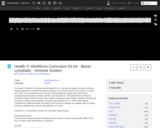
This unit describes the blood, lymphatic and immune systems.
- Subject:
- Health and Medical Science
- Material Type:
- Lecture
- Provider:
- Open Michigan
- Author:
- Oregon Health & Science University
- Date Added:
- 01/13/2021

This unit describes the blood, lymphatic and immune systems.

This presentation provides an introduction to the immune system and how it’s activated. In continuation of this we’ll discuss how inflammatory beta cell destruction comes about in type 1 diabetes. Furthermore we’ll discuss how beta cell failure occur in type 2 diabetes.
Course responsible: Associate Professor Signe Sørensen Torekov, MD Nicolai Wewer Albrechtsen & Professor Jens Juul Holst

This video on HIV in Global Health introduces the student to the origin, and major milestones in the HIV pandemic. Students will learn about scientific breakthroughs in HIV research including important trials. The video also provides insight into public health initiatives to limit the pandemic such as ART programs and different testing strategies. Finally the video sums up future challenges for ending the HIV pandemic.

Psychology is designed to meet scope and sequence requirements for the single-semester introduction to psychology course. The book offers a comprehensive treatment of core concepts, grounded in both classic studies and current and emerging research. The text also includes coverage of the DSM-5 in examinations of psychological disorders. Psychology incorporates discussions that reflect the diversity within the discipline, as well as the diversity of cultures and communities across the globe.Senior Contributing AuthorsRose M. Spielman, Formerly of Quinnipiac UniversityContributing AuthorsKathryn Dumper, Bainbridge State CollegeWilliam Jenkins, Mercer UniversityArlene Lacombe, Saint Joseph's UniversityMarilyn Lovett, Livingstone CollegeMarion Perlmutter, University of Michigan


Students learn how viruses invade host cells and hijack the hosts' cell-reproduction mechanisms in order to make new viruses, which can in turn attack additional host cells. Students also learn how the immune system responds to a viral invasion, eventually defeating the viruses -- if all goes well. Finally, they consider the special case of HIV, in which the virus' host cell is a key component of the immune system itself, severely crippling it and ultimately leading to AIDS. The associated activity, Tracking a Virus, sets the stage for this lesson with a dramatic simulation that allows students to see for themselves how quickly a virus can spread through a population, and then challenges students to determine who the initial bearers of the virus were.